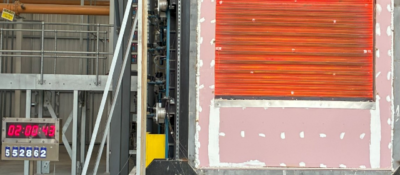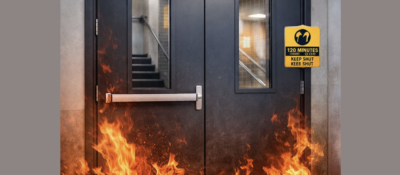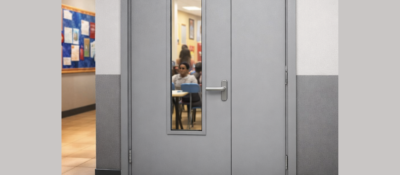When it comes to safeguarding our assets, we recognise that the primary line of defence for any business is the entry points. Security doors, especially those made of steel, are an integral component in fortifying the premises and mitigating potential risks.
Steel security doors are an excellent choice for property owners who are keen to enhance the security of their property. They provide a robust barrier against unauthorised entry, representing a physical and visual deterrent to potential intruders. Constructed to withstand forceful attacks, these doors are not just about strength but also about reliability and the peace of mind that comes with knowing your property is well-protected.
The significance of installing high-security doors extends beyond the immediate protection of property; they can also influence the overall safety of the occupants. In commercial settings like retail security doors, industrial security doors, or apartment security doors, steel security doors contribute to a safe environment for employees, residents, and customers alike.
In addition to security, fire protection is a critical consideration for any commercial establishment. Fire-rated steel doors are engineered to meet stringent fire safety standards for both internal and external applications. These doors are crafted to the highest standard and come with a variety of lock options, combining security with ease of access.
Fire-rated doors are not only robust against break-ins but are also designed to withstand high temperatures and prevent the spread of fire. By containing the fire within a specific area, these doors allow more time for evacuation, which can be the difference between life and death in emergency situations. The ability to delay the spread of fire makes these doors particularly suitable for areas where both fire safety and security are paramount.
For additional insight into the installation and benefits of fire-rated steel doors, and to explore our range of products, please visit security door installation and secure entrance doors. Choosing the right fire-rated steel door means considering various factors such as fire resistance level, door size, and locking mechanisms, which are discussed in detail in the sections that follow.
Steel security and fire-rated doors serve as pivotal elements in the comprehensive security strategy of any commercial property. Their installation is a testament to the commitment of property owners to ensure a secure and safe environment for everyone within. For those considering such investments, it is advisable to consult with reputable security door suppliers to ensure that you are selecting the best products for your specific needs.
Steel security doors are a fundamental component in safeguarding properties. Their robust construction and advanced features provide enhanced protection against intrusions and environmental elements. We will explore the locking mechanisms, weather resistance, and energy efficiency of these doors, which are crucial for business owners looking to secure their property.
The locking systems on steel security doors are designed to be highly secure and difficult to compromise. These doors often feature reinforced frames and hinges, alongside complex locking mechanisms that are challenging to pick or bypass. Such mechanisms may include multiple point locks, deadbolts, and electronic access controls, ensuring that only authorised persons can gain entry.
| Lock Type | Description |
|---|---|
| Deadbolts | Provide additional strength against forced entry |
| Multipoint Locks | Engage the door at several points for enhanced security |
| Electronic Locks | Allow for keyless entry and can be integrated with access control systems |
Information courtesy of Security Direct UK
Our high-security doors are engineered to withstand harsh weather conditions, making them an ideal choice for external entry points. The heavy-duty steel construction is treated to resist corrosion and rust, ensuring longevity even in adverse climates. Weather stripping and seals are also applied to prevent water ingress and drafts, which contributes to the overall durability and performance of the door.
| Feature | Benefit |
|---|---|
| Corrosion Resistance | Prolongs the lifespan of the door in wet conditions |
| Weather Stripping | Prevents water and wind from penetrating the door edges |
| Insulated Core | Protects against temperature extremes |
In addition to security, steel security doors also contribute to the energy efficiency of a property. The insulated core within these doors helps to maintain heat during the colder months and keep interiors cool during the warmer periods, leading to potential energy savings. By keeping out drafts and reducing heat loss, these doors are not just a security investment but a practical one for property owners mindful of energy costs.
| Season | Energy Efficiency Benefit |
|---|---|
| Winter | Reduces heat loss, lowering heating costs |
| Summer | Blocks heat ingress, reducing cooling needs |
Regular maintenance such as cleaning, occasional touch-ups for scratches, and periodic lubrication for hinges and locks can further extend the life and performance of the door. For a variety of settings including commercial, industrial, retail, and even apartment use, steel security doors offer a blend of aesthetic customization and functional excellence. Explore our range and consult with security door suppliers to find the best fit for your needs.
Selecting the appropriate security door is a critical decision for business owners who are intent on safeguarding their property. With a range of options available, it's vital to consider key factors that contribute to the effectiveness and suitability of a commercial security door.
When we're in the market for commercial security doors, we must evaluate several aspects to ensure we're making an informed choice. Here are the primary factors that should guide our decision:
The table below summarises these considerations:
| Consideration | Description |
|---|---|
| Steel Thickness | Gauge of steel impacting the door's strength |
| Lock Type | Security level of the locking mechanism |
| Fire Rating | Duration the door can withstand fire |
| Insulation Rating | Energy efficiency of the door |
| Warranty | Protection against defects or wear |
For additional insights into the type of steel and locking mechanisms used in security doors, we can refer to Security Direct UK.
When it comes to aesthetics, security doors need not be utilitarian in appearance. We can personalise our choice to align with the architectural style and design ethos of our premises. Here are some customization options:
Customization goes beyond mere appearance, allowing us to tailor the door's features for specific applications, whether for a retail, industrial, or residential setting. For a comprehensive view of the customization possibilities, Security Direct UK provides detailed options.
By carefully considering these factors and customization options, we can maximise the security, functionality, and aesthetic appeal of our commercial property. It's also wise to consult with reputable security door suppliers and experts who can assist with security door installation and ensure that all aspects meet our specific requirements.
When we consider the installation of commercial security doors, it's necessary to understand the benefits and assurances that come with security rated doors. These benefits go beyond just the physical barrier against unauthorised access; they provide a range of advantages that contribute to the overall safety and resilience of a commercial property.
Security rated steel doors are meticulously engineered to meet stringent security standards, such as those set by the LPCB LPS1175 Security Direct UK. Independent third-party organizations rigorously test and certify these doors to ensure compliance with strict security benchmarks. High-quality steel construction, coupled with advanced locking systems, fortified frames, and robust hinges, equips these doors to withstand break-ins and forced entry attempts.
These doors are not just barriers; they're integral components of a comprehensive security strategy. They're frequently utilised in high-stakes environments such as financial institutions, government facilities, and data centers, assuring owners that their premises are safeguarded by doors conforming to the highest security specifications.
The durability of security rated doors is a significant benefit, especially in commercial and industrial settings where robustness and longevity are paramount. The superior materials and construction techniques used in security rated doors ensure they can endure physical attacks and harsh environmental conditions, which translates to an extended lifespan and reduced need for replacements or repairs.
The table below highlights the LPCB LPS1175 levels for steel security doors, offering insight into the various levels of protection available:
| LPCB Rating | Typical Use Case |
|---|---|
| Level 1 | Schools, Universities |
| Level 6 | Banks, Police Stations, Ministry of Defence |
Security Direct UK provides a range of doors tested to these levels, ensuring a fit for various security needs.
In selecting a security rated door, it's essential to consider factors such as the door's security level, the grade of steel, locking mechanisms, fire rating, and warranty. These elements collectively define the door's protective capabilities, its ability to withstand wear and tear, and its functional reliability over time.
By investing in security rated doors, businesses not only solidify their defense against unauthorised entry but also potentially benefit from lower insurance premiums due to the doors' recognised standards Security Direct UK. This recognition can translate into substantial financial savings for the business while enhancing the safety of employees and assets.
For those in the market for these robust security solutions, exploring options from reputable security door suppliers is the first step towards fortifying a commercial space. Whether the requirement is for retail security doors, industrial security doors, or apartment security doors, understanding the benefits of security rated doors is pivotal in making an informed decision.
When we consider enhancing our property's security with commercial security doors, understanding the various security ratings is essential. These ratings not only indicate the level of protection a door can provide but also influence aspects such as insurance premiums.
The Loss Prevention Certification Board (LPCB) has developed a rating system known as LPS 1175. This system is used to categorise the resilience of security measures, such as high-security doors, against attempted breaches. The ratings range from SR1 to SR8, with SR1 being suitable for deterring opportunistic attacks using minimal tools, and SR8 providing resistance against highly aggressive forced entry attempts.
As of Issue 8, LPS 1175 adopts a more dynamic categorization system, comprising two elements: the threat level (Letter A to H) and the delay (Numeric value 1, 3, 5, 10, 15, or 20). The threat level corresponds with the toolkit used for testing the product's resistance to intrusion, and the delay indicates the minimum amount of time (in minutes) the product can withstand an attack while locked.
Here's a simplified table reflecting the LPS 1175 Security Ratings for quick reference:
| Rating | Threat Level | Delay (minutes) | Tools Involved |
|---|---|---|---|
| SR1 | A | 1 | Minimal tools (e.g., screwdrivers, pliers) |
| SR2 | B | 3 | Increased toolset (e.g., bolt cutters) |
| SR3 | C | 5 | General tools (e.g., crowbars) |
| SR4 | D | 10 | Specialist tools (e.g., power drills) |
| ... | ... | ... | ... |
| SR8 | H | 20+ | Heavy-duty tools (short of explosives) |
Source: Security Direct UK
Insurers often recognise security products with LPS 1175 ratings. Doors that are independently tested and certified to meet Security Levels 1-4, in particular, are acknowledged by insurers and can lead to lower insurance premiums. This is because these doors are seen as a cost-effective way of physically securing business premises against theft, criminal damage, and environmental harm, thus reducing the risk insurers are taking on.
Moreover, by investing in an LPS 1175 certified security door, business owners are not only protecting their property but also potentially reducing ongoing operational costs. It's a long-term investment that safeguards not just the premises but also the assets and people within.
To ensure a door meets the specific security requirements, it's recommended to consult with security door suppliers that specialise in products with LPS 1175 certification. Whether it's for retail security doors, industrial security doors, or apartment security doors, choosing a door with the appropriate LPCB rating is a key step in enhancing commercial security. Furthermore, professional security door installation is crucial to ensure that the door functions as intended and provides the maximum level of protection.
Ensuring the integrity and reliability of commercial security doors is paramount for business owners looking to safeguard their property. We'll delve into the testing and certification process that underpins the effectiveness of these security measures.
The LPS 1175 testing process is a rigorous evaluation conducted by the Loss Prevention Certification Board (LPCB), which is part of the Building Research Establishment (BRE). This test assesses the resilience of physical security products, such as steel security doors, security grilles, and shutters, against attempted breaches by intruders.
The test is comprehensive, involving experienced testers who use a specified range of tools to attempt to bypass the security product within a set time frame. The tools and time allowed are determined by the security rating level being tested for. The associated hardware, including frames and locking mechanisms, is also scrutinised as part of the test (Security Direct UK).
The LPS 1175 security ratings range from SR1 to SR8, with SR1 being suitable for low domestic and commercial risk, deterring attacks with basic tools like screwdrivers and pliers, to SR8 designed to withstand highly sophisticated attempts involving heavy-duty tools.
| Security Rating | Tools Used (Category) | Typical Application |
|---|---|---|
| SR1 | Category A (e.g., screwdrivers, pliers) | Low domestic/commercial risk |
| SR8 | Category H (e.g., power tools, heavy equipment) | High-security areas |
The latest Issue 8 of LPS 1175 introduces a more nuanced classification system, combining threat level (Letter A to H) with the delay (Numeric value 1, 3, 5, 10, 15, or 20) to indicate the minimum time the product can withstand an attack in its locked state. This dual-element rating provides a clearer understanding of the product's defensive capabilities against various threat scenarios (Security Direct UK).
When security products like commercial security doors are independently tested and certified to the standards of LPS 1175, insurers take note. Products adhering to LPS 1175 Issue 8 Security Levels 1-4 are particularly recognised by insurers, often leading to reduced insurance premiums for businesses (Security Direct UK).
This recognition is not merely a formality; it signifies that the product has been thoroughly vetted for its ability to protect against theft, criminal damage, and environmental harm. As a result, businesses can benefit from both heightened security and financial savings. It's an investment that provides both tangible protection for staff and assets and intangible peace of mind.
For businesses considering the installation of certified high-security doors, it is advised to consult with security door suppliers who can provide products that meet or exceed the relevant LPS 1175 standards. By opting for tested and certified doors, companies are taking a proactive step in fortifying their premises against potential threats.

Installing a fire shutter over a servery hatch? Learn why floor-level testing may not cover countert...

Security Direct was appointed to supply and install a series of FD120 steel fire doors with integrat...

Steel fire doors provide critical fire protection in commercial and industrial buildings. Learn the ...